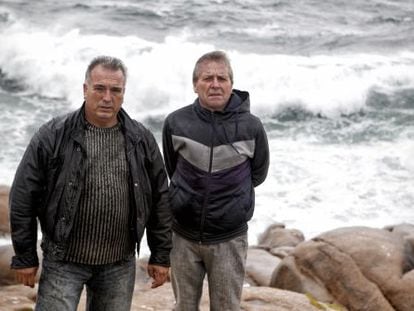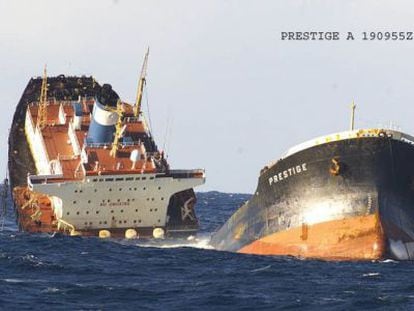“Many of us lined our pockets with the Prestige oil spill”
Galician fishermen miss big subsidies that followed 2002 disaster while other locals regret damage

The cry of a seagull is the only thing that breaks the silence in the narrow streets of Muxía. People are resting and napping, and the sea is calm today. This Galician town reaches out into the Atlantic in northwestern Spain in the form of a promontory. The air smells of the sea, boats and fishing gear. We are in the heart of the Costa da Morte – the “Death Coast.”
To the south of Muxia is the small beach of O Coido, formed by large round rocks. This is ground zero for the Prestige catastrophe, which took place 15 years ago, when an oil tanker broke in half off the coast of Galicia and blackened 2,000 miles of coastline.
The tragedy started in this cove, where the first spots of oil were found. Juan and Nita live next door. Juan is retired and helps Nita maintain a conger eel drying system. “I think we are the only ones who did not see a penny from the Prestige,” he says. “The people here lined their pockets.”
The Prestige catastrophe of 2002 blackened some 2,000 miles of coastline
Juan and Nita requested compensation from the Galician government when the health department stopped them from continuing their fish-drying business. “But they told us that we had been classed as a cannery and that canneries did not receive aid,” Nita says. So they ended up in no man’s land. “We could not work and they did not give us any help. We are the exception, we were left looking like fools.”
Nita said her fisherman neighbors received “one million pesetas [around €6,000] a month.” Juan adds: “Within two weeks the money was already circulating. I had never seen so much money in one place as I had with the Prestige – so much so that, when the ban on fishing ended, some fisherman stained the fish they caught with oil to try and deceive the regional government and stretch out the aid for another month or two.”
Flooded
According to the report from the investigation, on November 13, 2002, on board the Prestige oil tanker a loud bang was heard. In the middle of a storm, the ship began to list and take on water. Five minutes later a distress signal was sent out.
This is terrible to say, but here, among the people who work at sea, you hear people wishing for another Prestige A fisherman from Muxia
The crew was evacuated but the captain refused to leave the vessel. A juicy compensation package offered by the insurance company for anyone who could save the ship blocked operations that could have prevented the oil spill. Heavy seas made the situation worse. The ship moved away from land, and was adrift for four days. On November 19, it broke in half and sunk about 250 kilometers off the Costa da Morte.
A fisherman from the area said that when the fishing fleet were grounded people immediately flocked to town halls to ask if they would receive compensation. “Within a week the mayors already had the money,” he explains, preferring to remain anonymous. “People even started to sign up women and children [as fishermen].”
Another sailor chimes in. “The first month they started giving me €2,000 a month plus €6,000 in compensation, but the captains got a lot more. We received much more than we would have if we had gone out to sea. It was like a vacation and a fixed salary. We were all happy, to tell you the truth.”
The first fisherman adds: “They paid out, and paid out very well. The mayors didn’t cause any problems. They even gave money to those who enrolled [as fishermen] at the last minute. People bought apartments and cars, I am not exaggerating. This is terrible to say, but here, among those who work at sea, you hear people wishing for another Prestige.”
The seafood found during the oil spill was incredible. Human intervention is much worse than an oil spill for the sea A fisherman from Muxia
“Another? I’d like another eight,” interrupts the other sailor. Then he adds, as if he had just heard his own voice: “The damage was huge and I was very sorry. I went to help clean up myself. But we were risking our lives and they gave us more money than we had ever seen, and we did not have to go out to sea.”
A few months after the accident, the mayors of the Costa da Morte won re-election. Since most of them were from the Popular Party (PP), their re-election generated confusion among that part of the Galician population that blamed the catastrophe on the central PP government in Madrid’s handling of the incident. While there were protests in Santiago, Vigo and A Coruña, there were hardly any protests in the coastal towns.
“There’s no doubt that the millions that rained down here left the people calm. But I’m going to tell you something: How was the sinking of an oil tanker the fault of the mayors from round here? What does one thing have to do with the other?” says one of the fishermen. He adds: “It was politicized, but here we saw it another way. There was an accident and they helped make sure it didn’t ruin us. Why would we protest? In fact, in Muxía, there were a couple of demonstrations. And there was no one from the town to be seen there.”
The pope’s spider-crabs
The Prestige spill forced a one-year grounding of fishing fleets. During that time, boats looking for fish or shellfish didn’t go out to sea. In Galicia, catches are regulated and there are cyclical closures for all species.
“The Prestige was the first true closure. People had money so they did not go out. Only seven or eight people went out along the coast during those months,” says one fisherman, who decided to venture out to sea at the time after he failed to obtain subsidies.
“I was looking for the clean places that the oil spill hadn’t reached, and I was taking hundreds of kilos of crabs and octopus. I had no competition. I went down and I found swarms of crabs. One day I took out 800 kilos of crabs.”The fisherman, who prefers not to give his name, ended up flush with cash. “I built myself a house.The restaurants bought my catches and they paid very well because there was a shortage. I took them the crabs and they would put them in water to see if they released oil or fuel. They would smell them, then buy them, and say to me, ‘Bring us more from this place’.
They are fools and only think about themselves and not about all the damage that did. I hope it never happens again Ángel, hostel owner in Muxía
“And do you know who went to those restaurants to eat? The volunteers who came to clean up. And the military. And everyone. I also sold the crabs that they gave to the pope when he visited Madrid in May! We were all very upset by what was happening, but nobody wanted to stop eating seafood.”
The fisherman – who later enrolled properly once things got back to normal – defends his actions during the ban: “I had to work, I was left with nothing if I didn’t. I had kids on the coast to warn me if the Civil Guard was coming and others helped me load the van. I always did it at night. In one hour I would take out hundreds of kilos. The richness and quantity of seafood found during the oil spill was incredible. Nothing like this had ever happened in Galicia. Only the cockles died, the rest multiplied. It was the closure we really needed. On the first day that the fishing boats went out a year later, they got more than a ton of octopus. Human intervention is much worse for the sea than an oil spill.”
Those who weren’t paid
Ángel runs a hostel in Muxía. From the beach of O Coido, he saw the oil spill hit 15 years ago. He saw, too, how the Prestige was drifting away. Ángel, his wife Celia and three other women (Rosa, Lita and Luisa) were among the first volunteers. “We went down to the beach to try to clean up. And immediately volunteers began to arrive from everywhere. First from colleges and then military. There were people from all over Europe.”
“Here everyone got money,” says Ángel. “Except for you know who? Those of us who helped.” Ángel got everything the military and volunteers asked him to, he got mops, he scrubbed, and he lent out clothes. His wife, Celia, cooked for 1,100 people when she finished work. “I would leave at 7am and I would start making stews, salads, soups... Then we would wash and clear up. So for months, it was like having another job, but I wasn’t getting paid.”
Celia and Ángel did not receive any kind of payment for their work. “But that wasn’t what we wanted. We did it to help,” says Ángel.And what do they think of people who hope for another Prestige? “They are fools. First because now there isn’t as much money around now as there was then, and they wouldn’t see a single penny. Also because they don’t realize that a lot of that money was hush money. And finally because they only think about themselves and not about all the damage that was done. I hope it never happens again.”
English version by Debora Almeida.













































